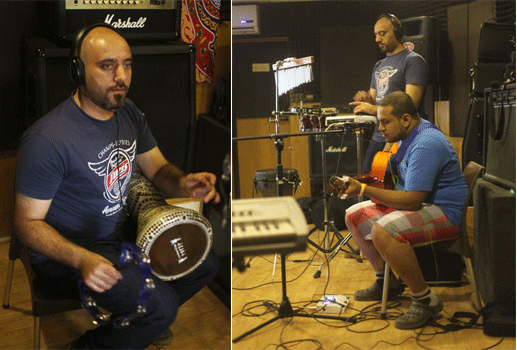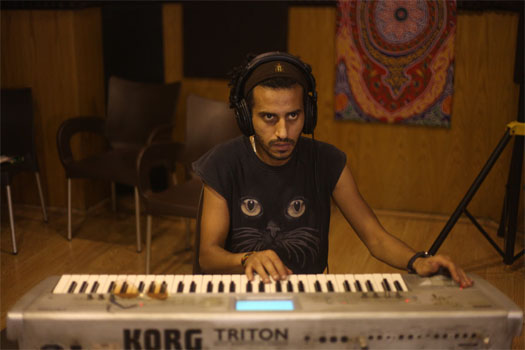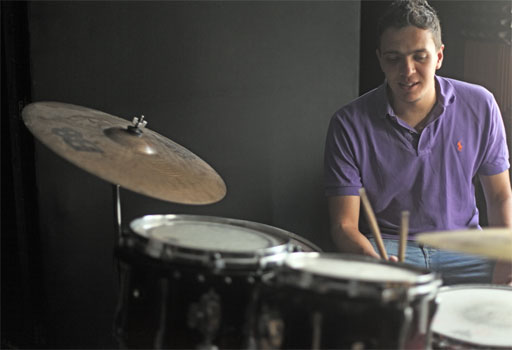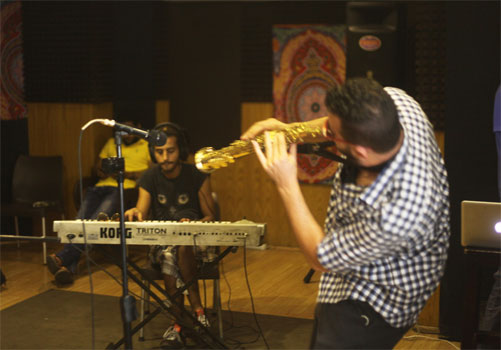The music is particularly vibrant in this room at Vibe Studio. A band consisting of a handful of independent musicians is in the middle of rehearsal, preparing for upcoming performances; the saxophonist leads them through their original compositions.
Suddenly the lights go out and silence falls – a reminder of the Egyptian government's energy-saving policy, which surprises everyone everywhere with abrupt power cuts. All the rooms open and the countless young musicians head to the waiting area soaked in the white backup light.
Surrounded by dozens of chattering musicians, I sit with Nour Ashour to talk about his career, his projects and Egypt's independent music scene.
Egyptian audiences identify Ashour with his saxophone – or, more specifically, with a whole family of saxophones: soprano, alto, tenor, baritone etc. Through over a decade of performing, Ashour has played with many bands: Ressala, Egypt's Crash Boom Bang, El-Dor El-Awal, among others. He also performs with the well-known Egyptian musician Mohamed Mounir in his live concerts in Egypt and internationally. One of his most recent music commitments is the Nour Project, the first project for which he is fully responsible in terms of artistic vision and direction.
Ashour reveals that his musical practice began rather late, during his studies at the business administration department of the Arab Academy for Maritime Transport in Alexandria. Though born to a professional musician in a house filled with music, Ashour's choice of music as a career was not aligned with his parents' dreams for their son.
"My father, Hussein Ashour, is a professional musician, a flautist and saxophonist who used to teach at the Faculty of Music Education in Zamalek, Cairo. Understanding all the drawbacks of the field, he didn’t want me to become a musician. Against his will, I began my life with music while still at the university; I knew this was what I was going to do," Ashour says.

Nour Project. Mohamed Nabil (left) and Ahmed Derbala with Mohamed Fahim in the background (right). (Photo: Sherif Sonbol)
Ashour agrees that life is not easy for musicians in Egypt, something that his parents must have been well aware of, hoping their children would choose what many define as "better careers," jobs that do not require financial struggles and are not subject to social prejudices.
"Many people not involved in music do not understand that it is a full-time, serious job. Music requires talent, charisma and hard work. Music can begin as a hobby but when treated in a professional way, and given full dedication, it becomes a profession and source of a stable income."
Ashour points to the fact that in Egypt musicians are not backed by a good arts management network. "We neither have producers nor real managers who will direct the artist towards growth and accomplishment. We have what I call 'booking agents'. As a result, many musicians need to develop a commercial mind, to know how to manage their music career wisely, develop contacts, open many doors, etc." Yet despite all the challenges, Ashour feels that independent musicians are in a privileged position in Egypt, due to their relatively small number. "Those who are serious about their music and concentrate on professional growth will succeed eventually."
It is worth adding however that saxophone is not a common instrument in Egypt, something that probably raises the demand for Ashour but at times makes his work a challenge. Apart from the significant impact of the saxophonist Samir Soror (1933-2003) on Egypt's music history, the instrument is not well-known. Soror in fact made changes to the saxophone's structure to be able to play the quarter tones characteristic of oriental music. He released several albums and has performed alongside iconic singers such as Umm Kolthoum, Abdel Halim Hafez and Fayza Ahmed. At the beginning of the 1990s, he also cooperated with Amr Diab.
"Soror is definitely one of my idols," Ashour says. "With his saxophone, he managed to reach everyone, from taxi drivers to upper class society. Of course I represent a different kind of music to Soror's, but it is the way that he popularised the instrument that I find inspiring." He adds that, today, few people from Egypt's middle and lower middle class are aware of the existence of the instrument, and one of the aims of the Nour Project is to change this, by bringing saxophone back into the limelight.

Nour Project: Fadi Badr on keyboard. (Photo: Sherif Sonbol)
The idea of Nour Project, basically a band dedicated to instrumental music, was born in 2011. Following months of preparation, the first performance took place at the beginning of 2014. "Singing is definitely a predominant factor in Egypt's independent music scene. Many Egyptian bands tell their stories through lyrics, linking them to the specific events. Its validity dies with the end of the event. Only a few go beyond current events. Music is a language that crosses borders and we can reach everyone everywhere with music only."
The saxophonist points to a limited number of musicians who perform instrumental music, among them Eftekasat and El-Dor El-Awal. "Years ago, we listened to lots of music that did not involve singing. This practice needs to be revived, something we try to do with Nour Project. Accordingly among the main aims of the band is to perform instrumental music that will be accessible to as large a number of people as possible."
Nour Project performs world music, a genre that proved to be very popular in Egypt, since as Ashour believes, today the country is seeing a plethora of musical influences, with young musicians exploring and fusing many genres: oriental, reggae, jazz, rock, African and Latin music. Likewise Nour Project is characterised by many genres and colours, and comes forward with their original music, composed mainly by Ashour and other band members.
"We have two covers only, one of them based on Nubian folk music with our arrangements," Ashour says. The band's lineup includes Ashour (saxophone), Ahmed Derbala (classical guitar), Fadi Bader and Wael Badrawy (keyboards), Gamal Fahim (drums), Muhammad Nabil (percussions), Ossama Mohamed (saz, a plucked string instrument resembling a long-necked lute) and other musicians joining on different occasions.
Apart from Nour Project, Ashour continues to be committed to, among other things, Crash Boom Bang, a commercial band performing covers from the '60s all the way to the '90s, from the golden years of Ray Charles, through Stevie Wonder to Michael Jackson.
"Playing covers is very important to any performer. It is one of the essential elements of creative development. This cumulative knowledge acquired through detailed practical analysis and performance of covers allows one to formulate one's own ideas, compose one's own music. The same applies to all creative fields; you cannot be a writer if you don't read books," Ashour explains, adding that apart from its musical benefits, the cover band is also a good source of income. "And even if a band does not perform covers on stage, it is important to make playing covers part of its regular practice, whether at home or in the studio."

Nour project: Gamal Fahim on drums. (Photo: Sherif Sonbol)
Equally Ashour performs with Mohamed Mounir and considers the experience an important factor in the development of his musicianship. "Throughout my life I was very lucky to be in touch with many musicians from whom I learned a lot. Mohamed Mounir is one of my absolute idols. He is a great musician and performer, very charismatic as well; he is a college in his own right. He projects amazing energy to the audience and to the musicians accompanying him. Not only do I value his music but performing with Mounir on stage is also a priceless experience for any musician." Ashour adds that getting to know Mohamed Mounir had been one of his dreams.
"One of the studios asked me to record a saxophone line for a song. I didn't know it was Mounir's song until the recording was completed. The song was released and I still hadn't even met Mounir. It was one year later, in 2009, that he contacted me directly and asked me to join him in his concert with Cheb Khaled. This was too good to be true, yet this is how it all began. I am very lucky." To this day, indeed, Ashour seems to be in disbelief about how it all happened, and five years later he is still faithful to his performances alongside Mounir.
Besides his frequent performances, Ashour seeks other ways to strengthen his musicianship. He has just returned from Groznjan, Croatia where he attended the Summer Jazz Academy, a festival that caters to young jazz musicians, offering an opportunity to deepen practical and theoretical knowledge and gain experience through interacting with professionally advanced colleagues, listen to their concerts and perform in different sets of ensembles. The mentors of Summer Jazz Academy 2014 included renowned musicians from Austria, Sweden, USA and Croatia. Ashour underlines the many artistic gains that he acquired there, adding that "music is based on a good ear and knowledge. It is knowledge that helps us reach perfection."
With a lot of commitments on his plate, Ashour will be performing more than once until the end of August. Nour Project's upcoming appearances include one with Aadet Mazzika, a radio programme hosted by Youssra El-Hawary on Nogoum FM, on 19 August; a concert at the Bibliotheca Alexandrina on 23 August; and a live performance at the Cairo Jazz Club on 26 August.
At the same time Nour Project are working on their first CD, to be released by the end of 2014. "The CD will probably have nine tracks with our music, including two or three songs," Ashour concludes. "We might feature a guest singer as well."

Nour Ashour on saxophone and Fady Badr in the background. (Photo: Sherif Sonbol)
This article was originally published in Al Ahram Weekly
Short link: